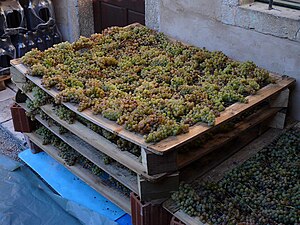Liastus

Liastos ( Greek Λιαστός ) is the Greek name for a mostly sweet wine, the grapes of which were slowly dried in the sun on wooden racks before fermentation in order to increase the relative sugar and extract content. The production essentially corresponds to that of a German straw wine , an Italian passito or a French vin de paille . The mats or wooden frames on which the late harvest grapes dry are called Liastes (Greek λιαστές ). Both words are derived from the Greek word for sun = Ήλιος .
The production method goes back at least to the wine culture of archaic Greece , but perhaps it is even older. During his stay with the Phaeacians, Odysseus admired the magnificent garden of Alcinous . Hesiod goes into detail , in his something after 700 BC. Chr. Written work works and days describes the time and method of winemaking.
In today's wine culture in Greece, the term is mainly used to differentiate an unpredited Vin Naturellement Doux from the Vin Doux Naturel that is common in Greece . So it is a type designation and not tied to wine regions or appellations. Wines of this type are made all over Greece from both red and white grapes in a wide variety of mixing ratios, with the methods of winemaking varying slightly, especially with regard to drying and fermentation. The wines cannot be uniformly described in terms of their quality or their sensory properties. In good years and with careful vinification, a Liastos can be a remarkable sweet wine. What they have in common is their sometimes pronounced sweetness and an alcohol content between 13 and 14 percent by volume . Well-known wines of this type come from Santorini , Samos and Siatista .
Individual evidence
- ↑ Keyword in Wein Plus (glossary)
- ↑ Odyssey 7th song, verse 123 ff. There is also a field, shaded by noble vines / Some grapes wither on a wide level of the garden, / Spread in the sun, and others are cut by the vintner, / Others are already being pressed. (Voss translation, quoted from this source )
- ↑ Hesiod: Ἔργα καὶ ἡμέραι, verses 609-614: When Orion and Sirios rise in the middle of the sky, / Eos at the same time looks at Arcturus, the rose-fingered one, / Then read all the grapes, O Perses, bring them home, / place them From ten days and nights of the warming sun, / Put them in the shade for another five days and fill what Dionysus graciously gave you into the barrels on the sixth. (Translation by H.Gebhardt, edited by E. Gottwein). Quoted from this source
- ↑ These details are defined for the time and the observation area of Hesiod as mid-September